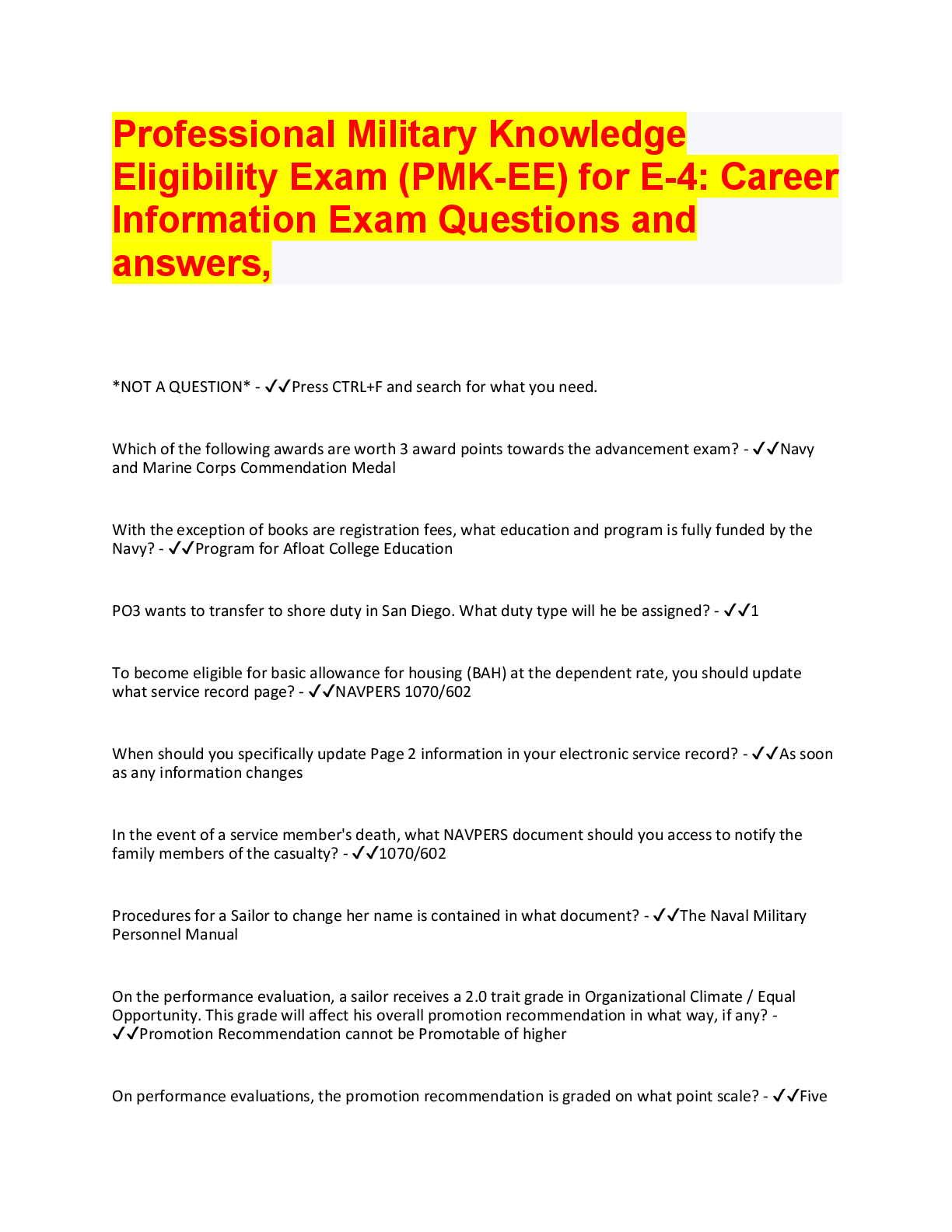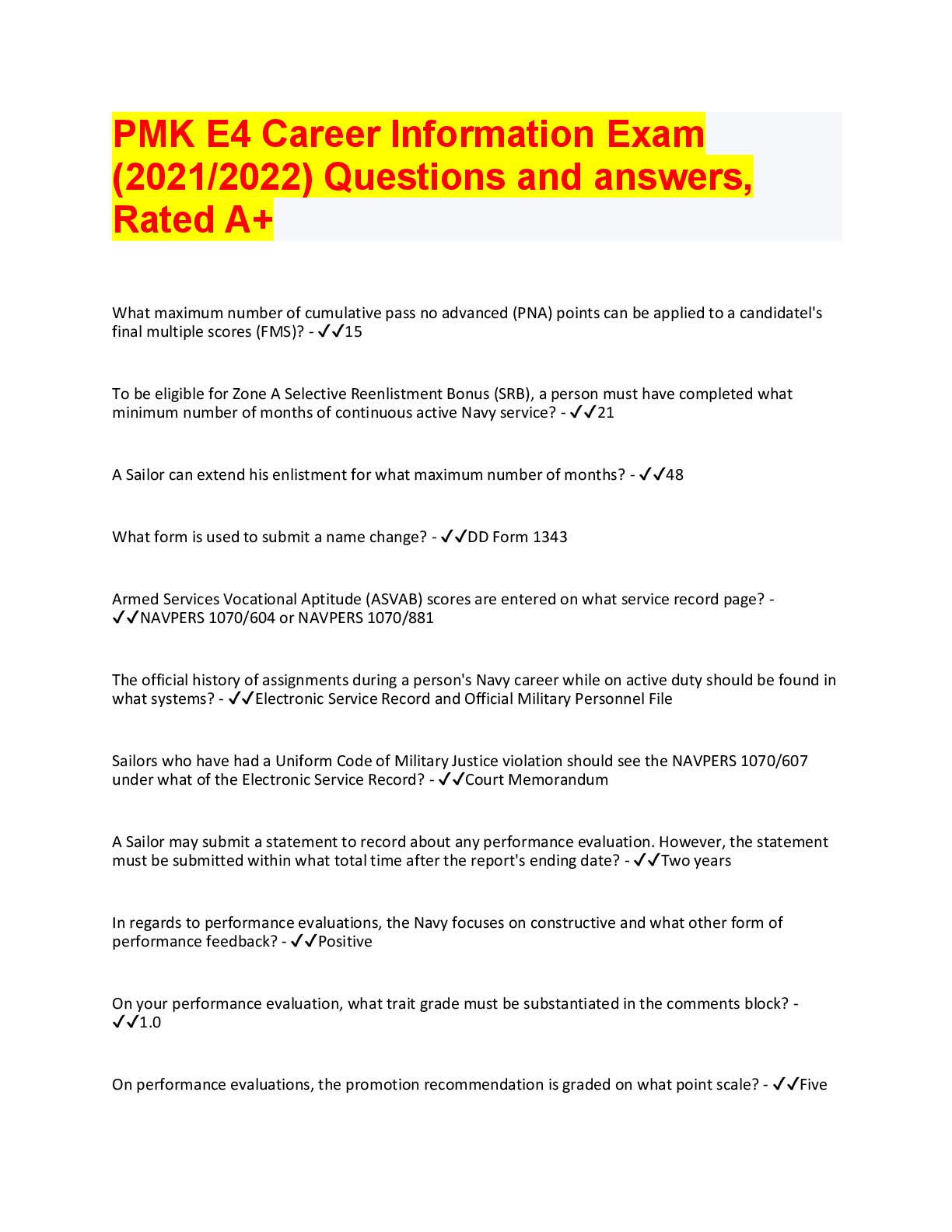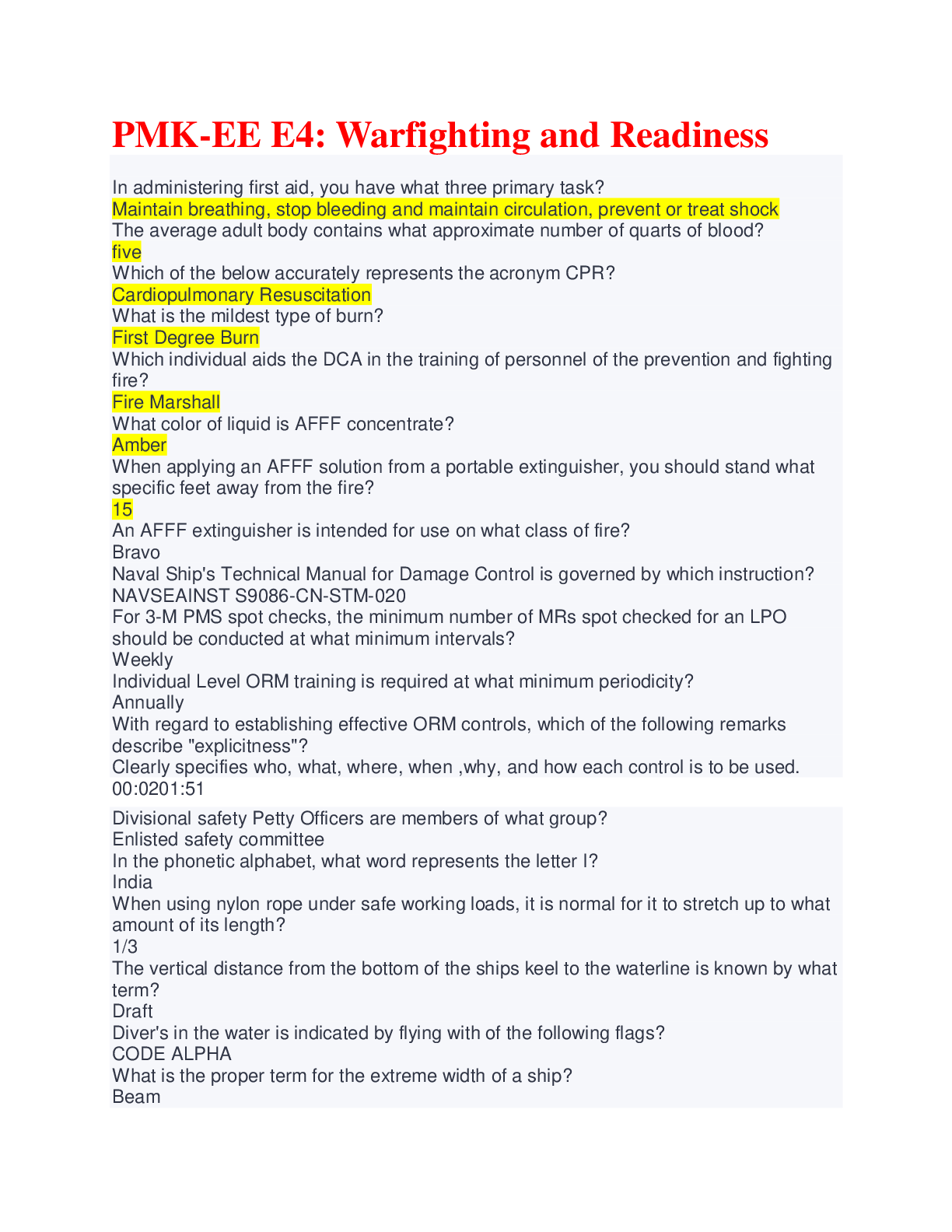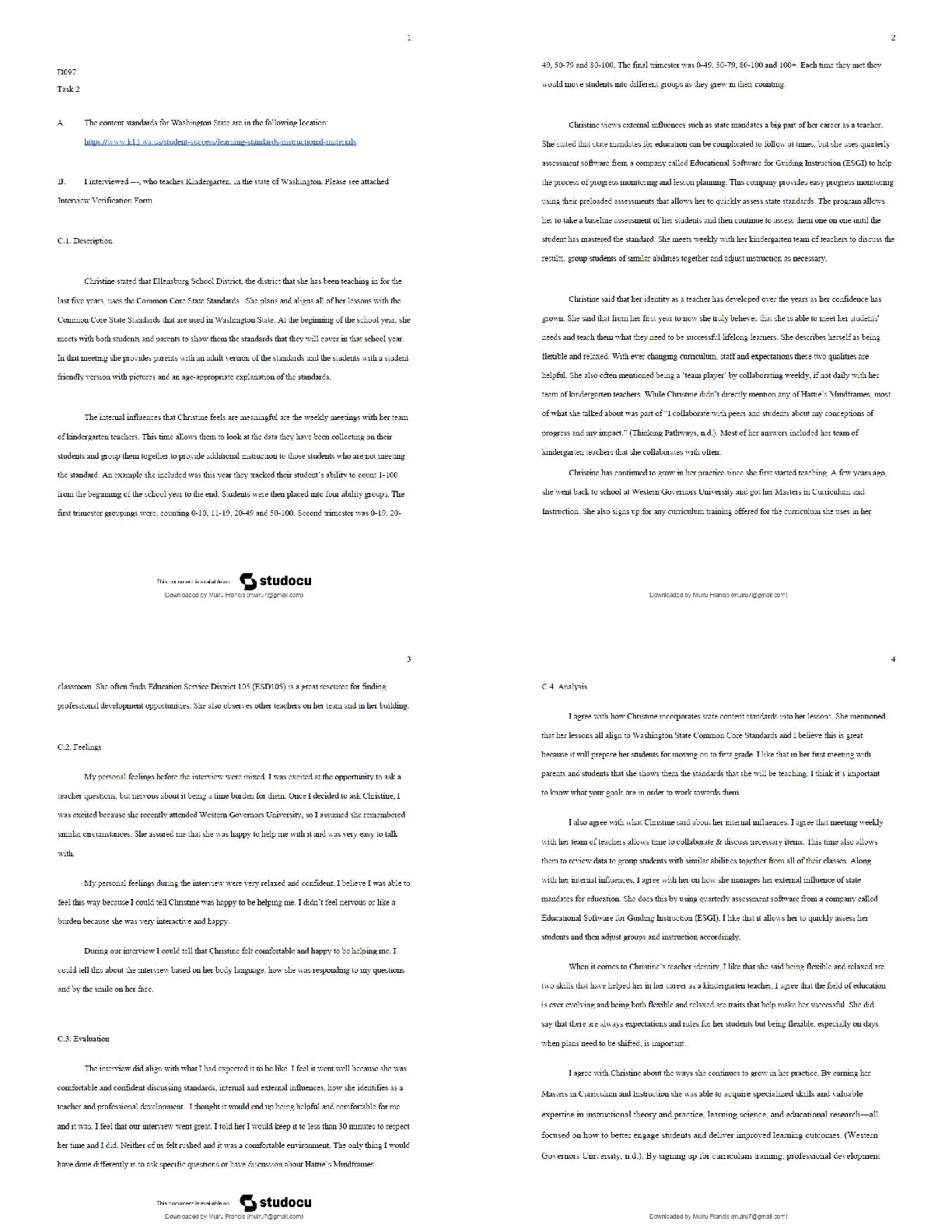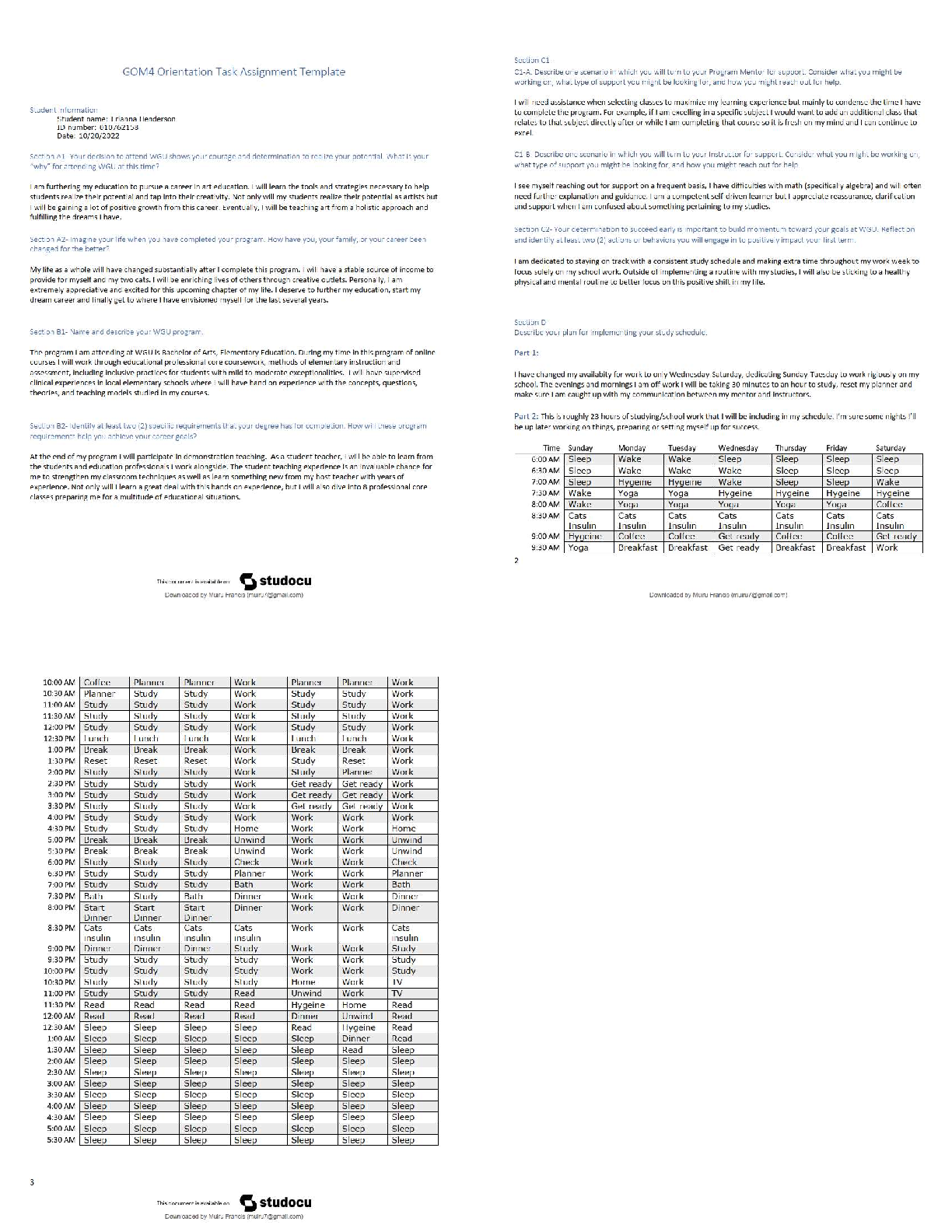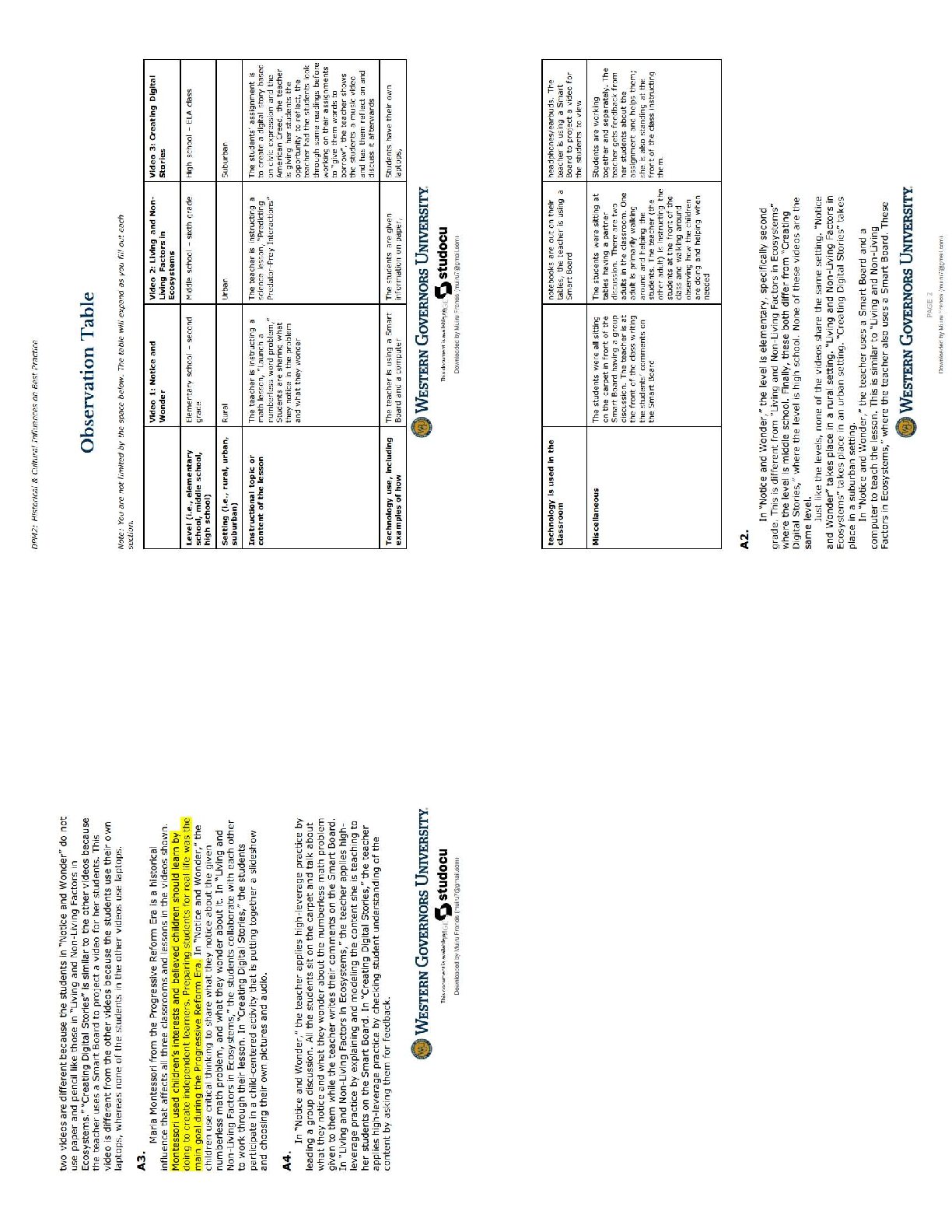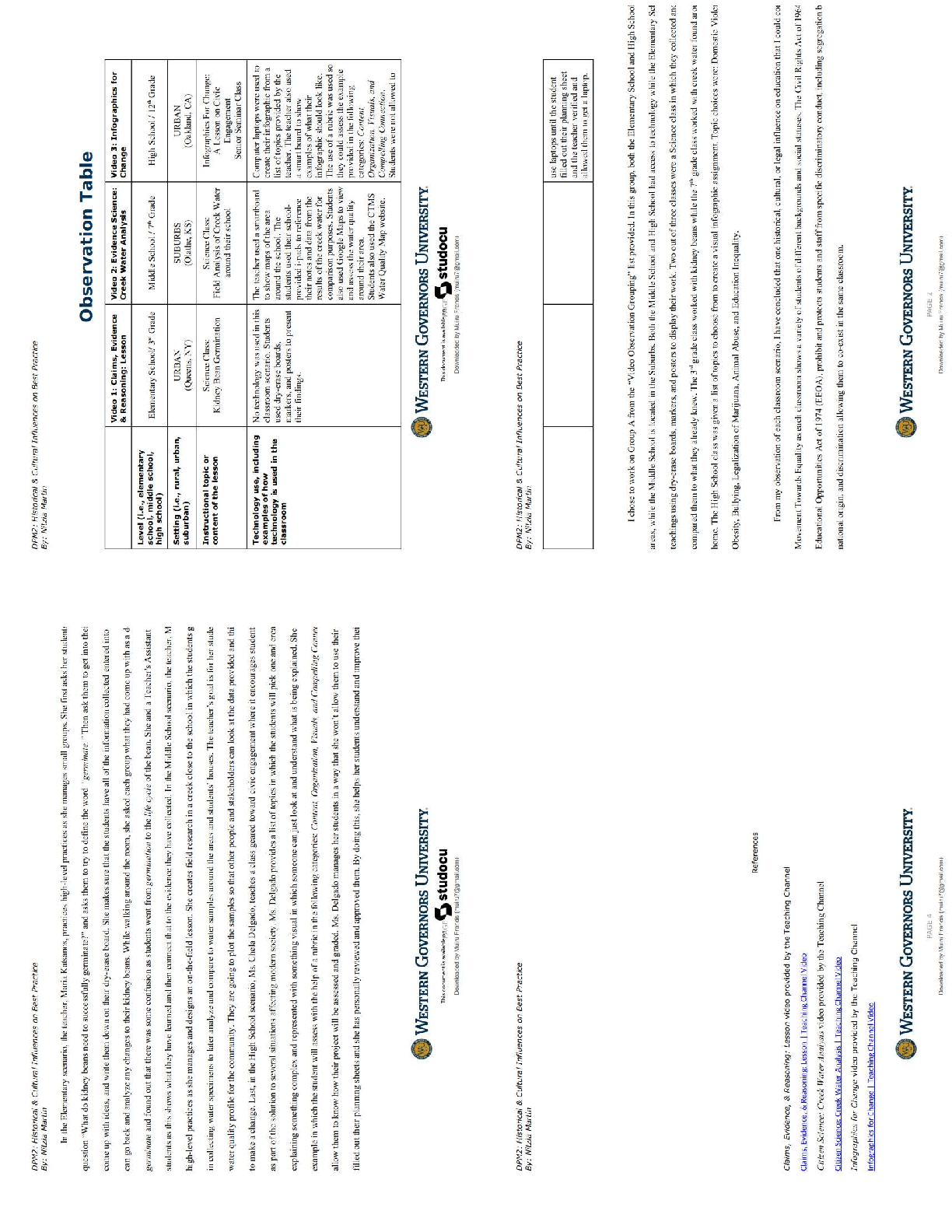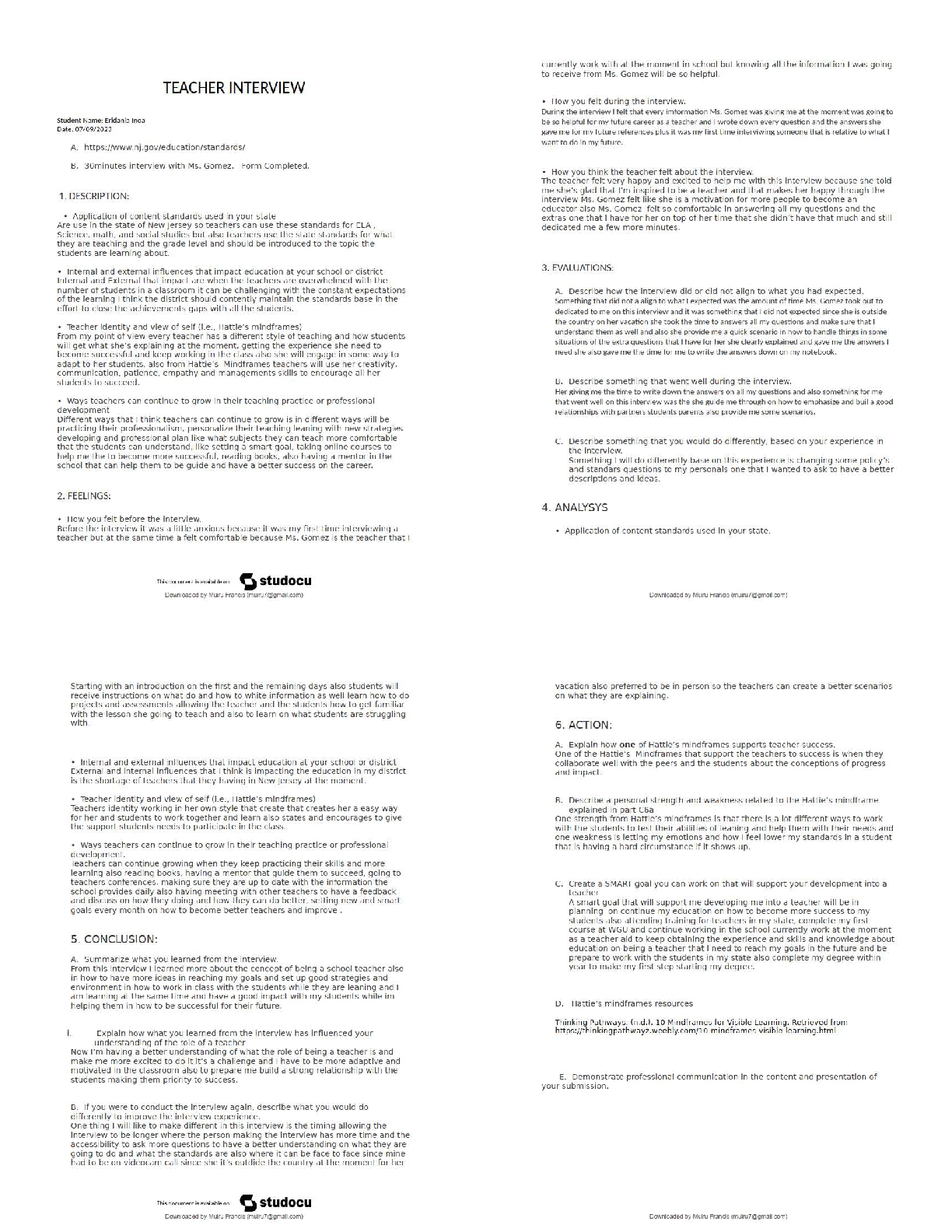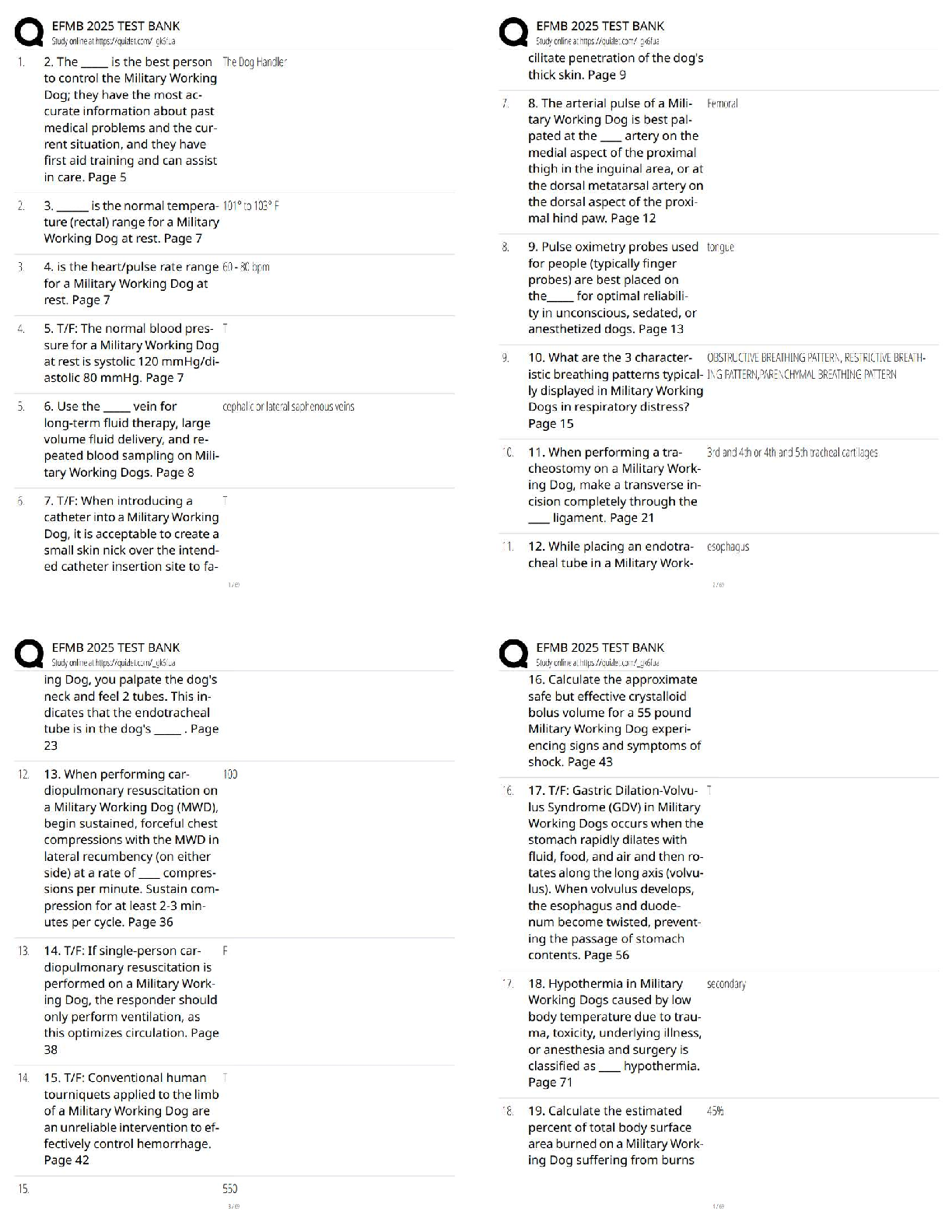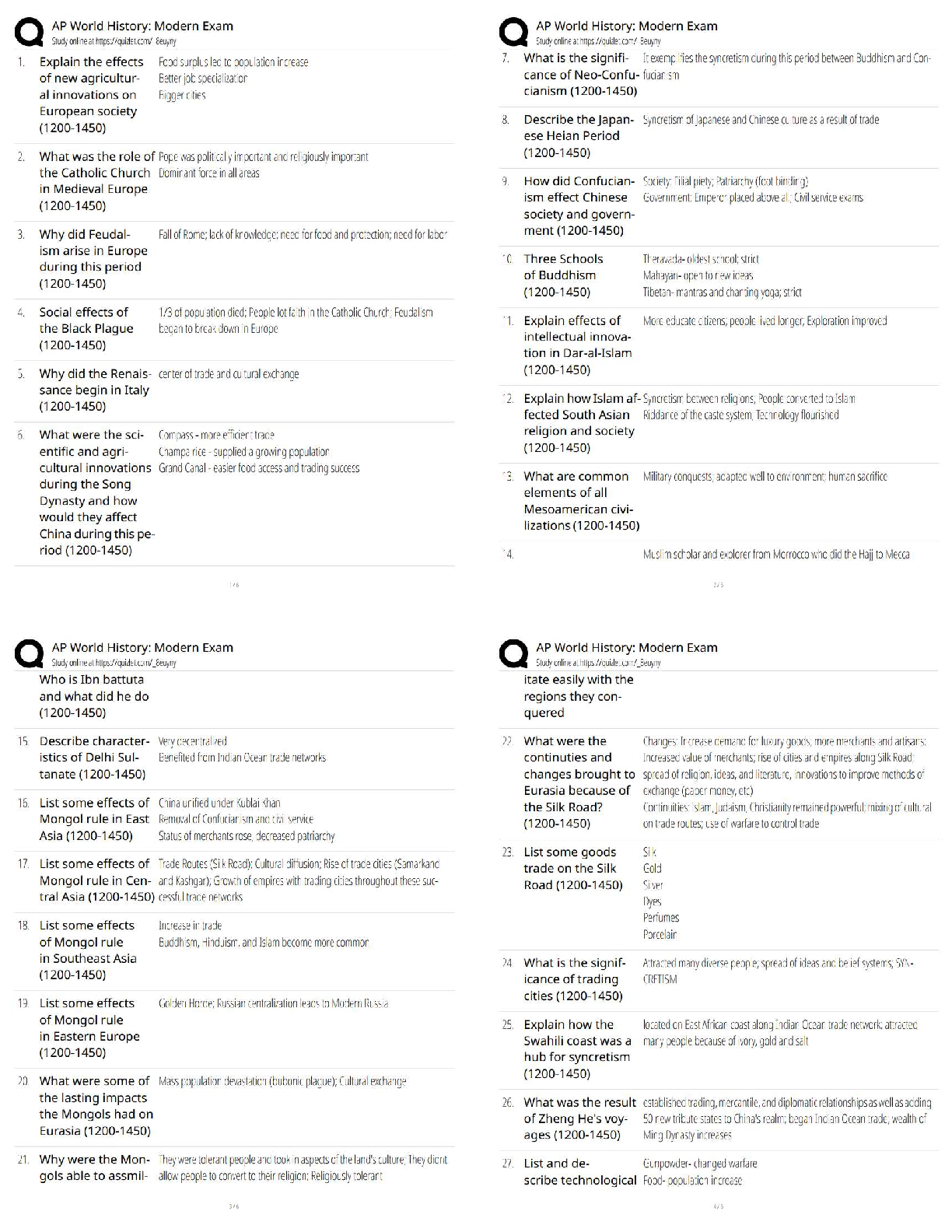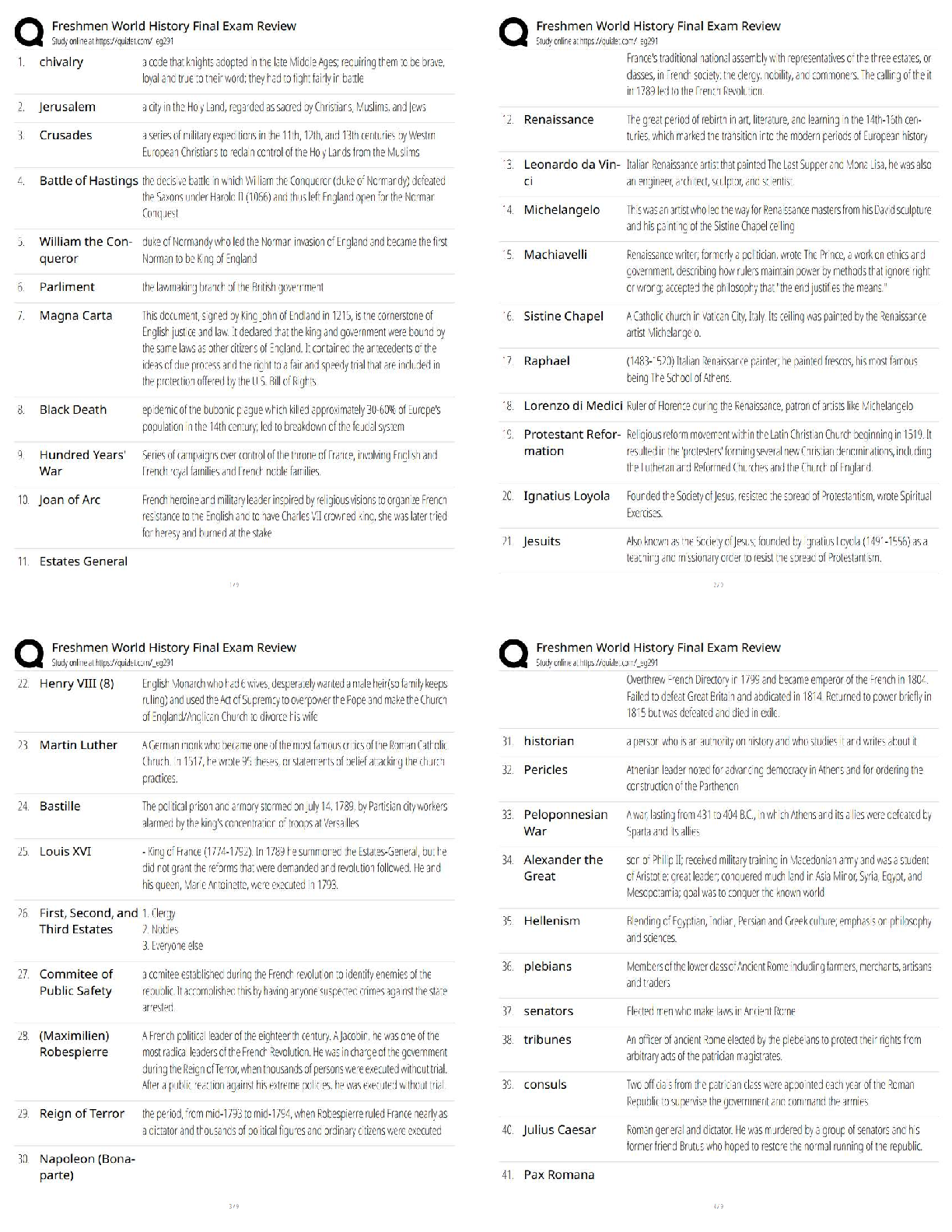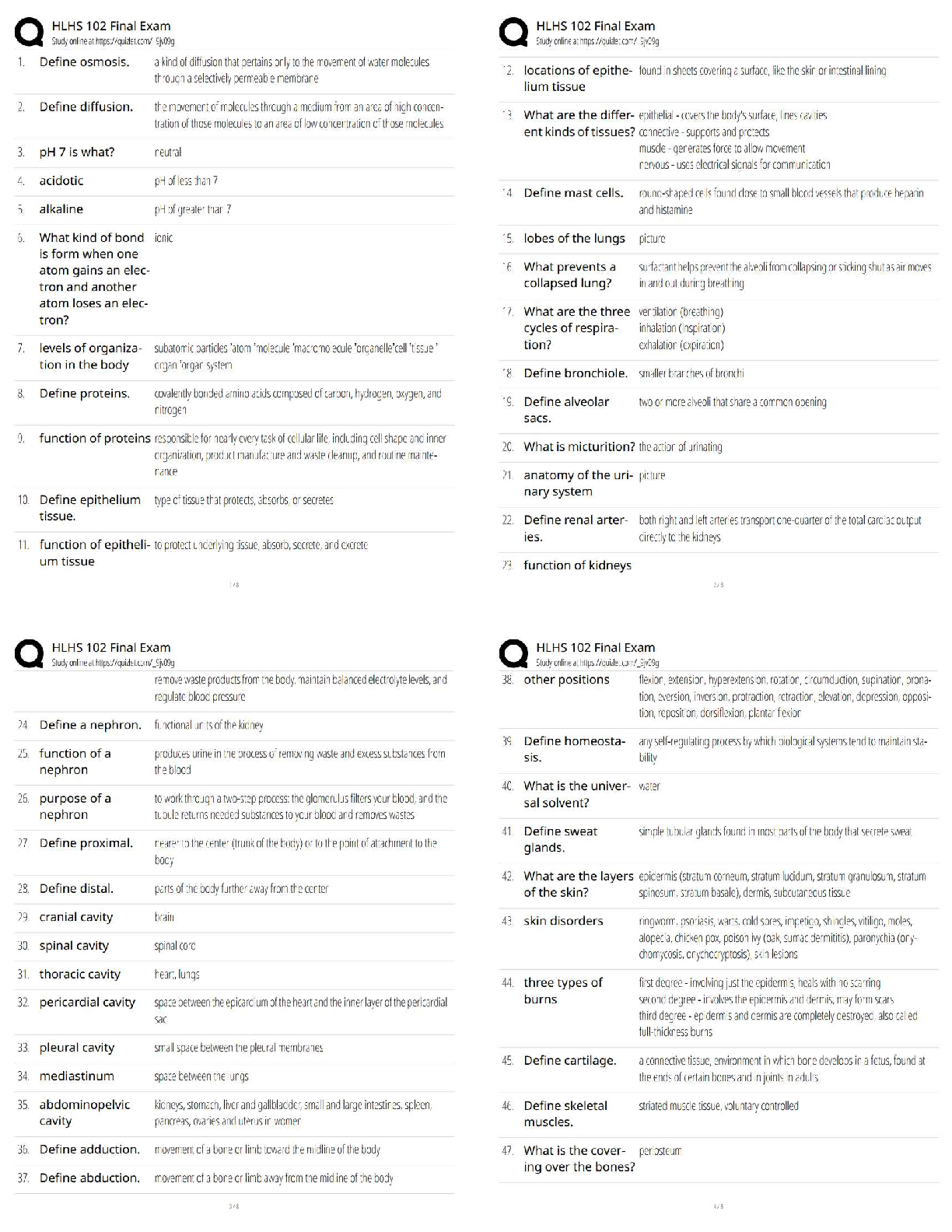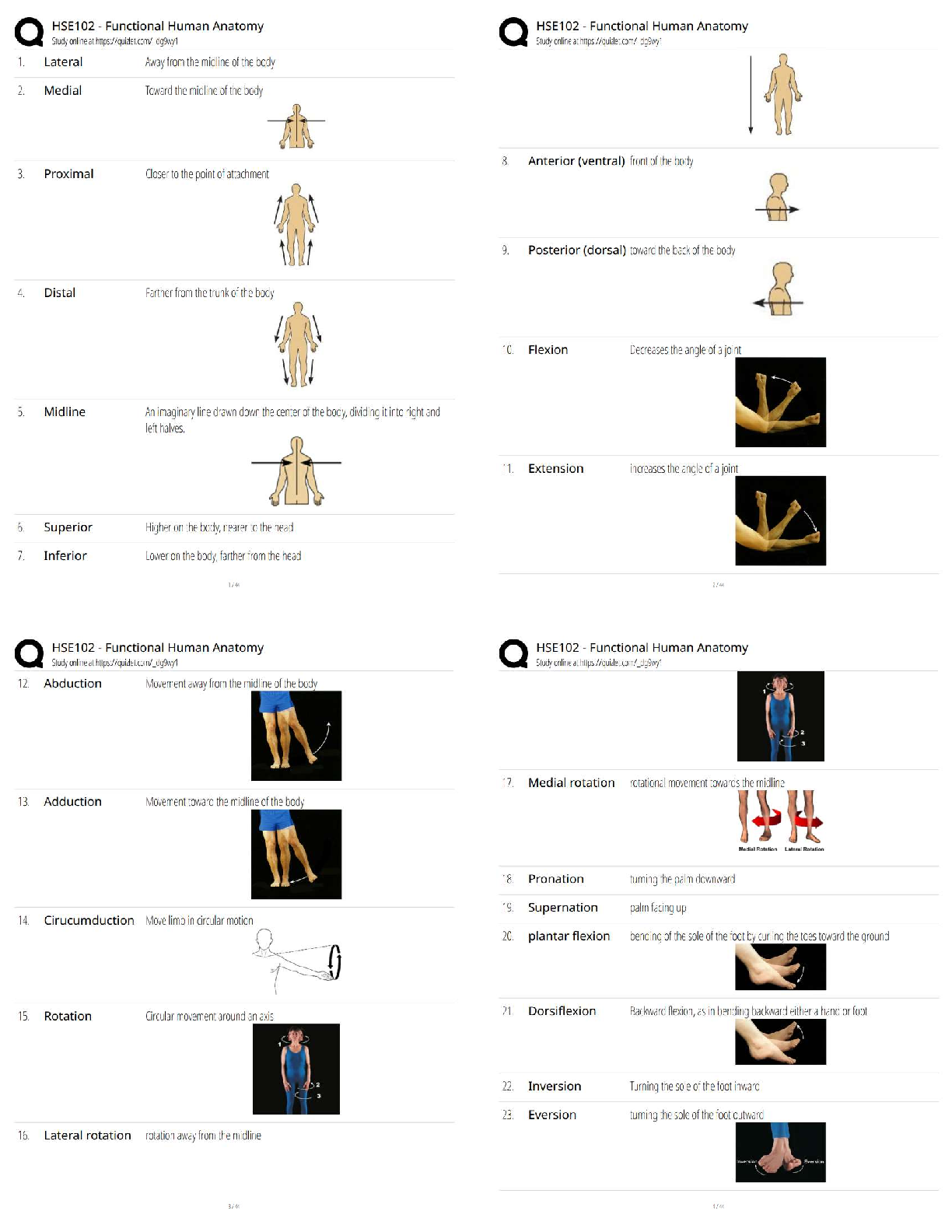History > QUESTIONS & ANSWERS > AP Euro Exam Review Questions and Answers 100% Correct. Graded A (All)
AP Euro Exam Review Questions and Answers 100% Correct. Graded A
Document Content and Description Below
AP Euro Exam Review Questions and Answers 100% Correct Scientific Revolution ✔✔advances in the knowledge of how nature works, included new discoveries and solved ancient problems, moved knowled ... ge from uncertainty to uncertainty, came in the fields of physics, astronomy, and medicine alchemy ✔✔the belief that matter could be understood and transformed by mixing substances and using secret formulas, a famous alchemist was Paracelsus, who said that metals as well as plants might have medicinal properties Vesalius ✔✔influenced anatomy and astronomy, wrote The Structure of the Human Body, member of the Padua faculty, pointed out errors in the work of Galen, he used dessections to produce anatomical descriptions that opened a new era of careful observation and experimentation in the study of bodies, influenced anatomy to move to a new level Copernicus ✔✔wrote On the Revolutions of the Heavenly Spheres, said that the calculations of planetary movements of Ptolemy were way too complex but Copernicus's were also complex, he believed in the heliocentric theory, which said the sun is the center of the universe, Polish, successors found his calculations to be indespensable, ideas became a part of inellectual discussion, influenced the creation of the Gregorian calendar, the scholarly community argued over the certainty of Copernicus's ideas Tycho Brahe ✔✔the leading astronomer of the era, produced the most remarkable observations of the heavens before the invention of the telescope by plotting the path of the moon and planets every night for decades, came up with an uneasy theory that was a compromise between the Ptolemaic and Copernican systemsKepler ✔✔German, made major advances in the work of Copernicus and helped resolve the uncertainties in astronomy, believed that only the language of math could describe the movements of the heavens, famous astrologer, thought Copernicus was right, wanted to confirm the heliocentric theory right, discovered the three laws of planetary motion, opened a new era in astronomy, proved that orbits of the planets are ellipses and that there is a regularity based on their distance from the sun which determines the movements of all planets Galileo ✔✔Italian, first to perceive the connection between planetary motion and motion on the earth, came up with the theory of inertia, was 1st to infer that Jupiter has satellites and moons, taught the heliocentric theory, which caused trouble with the church, they told him to quit teaching this and in fear of excommunication, he renounced beliefs, invented the telescope, was one of the first to approach his work in the same way as modern scientists, wrote Dialogue on the Two Great World Systems, advocated experience, reason, and doubt, did not let common sense and theological teachings get in the way Pope Gregory XIII ✔✔decided to reform the calendar in 1582, creating the Greorian calendar William Harvey ✔✔English doctor, revolutionized the understanding of the human body when he ientified the function of the heart and proved that the blood circulates Newton ✔✔contributed to math, physics, and astronomy, he combined these three to explain motion, developed calculus and the basic laws of modern physics, which govern the motion of the moon and the planets, wrote Principia, which said that math and experiments prove science and give it certainty, active participation in meetings of the Royal Society of London, provided the expanation of the movement of objects in space, said that the world was stable and orderly, first scientist to receive a knighthood in England epistemology ✔✔a new theory of how to obtain and verify knowledgeBacon ✔✔inspired scientists with what they could contribute to society, said that science is the savior of humans, greatest of science's propagandists, wrote the New Atlantis, which held his view of an ideal society, believed in induction induction ✔✔starting with observation, the logical process by which one moves to general principles, advocated by Bacon Descartes ✔✔French, made first attempt to apply the new methods of science to theories of knowledge, said that people can be deceived by their senses, so one should apply all knowledge to the princple of doubt, refusal to accept an authority without verification, came up with "I think therefore I am." showed the difference between faith and reality and the difference between science and fate and perception, theoretical instead of experimental, found difference between mass and weight, used deduction, wrote the Discourses deduction ✔✔knowing a fact with certainty, therefore you can deduce another fact, gaining facts from facts, advocated by Descartes Pascal ✔✔said that faith was more important than science, truths found in science are limited, wrote the Pensees, anxious about the growing influence of science Royal Society ✔✔formed by Robert Boyle and eleven others in 1660, acted as a more permanent and systematic organization of scientific activity, granted a charter by Charles II, served as a headquarters and clearing center for research, began publishing Philosophical Transactions Mannerism ✔✔attempt to escape reality, echoed by painters called Mannerists, El Greco was a huge mannerist, who cultivated artificial and esoteric images of the world El Greco ✔✔Greek, compelling, mystic,created an otherworldly alternative to the troubles of his time, cool colors, eerie lighting, elongated and agonized humans, used perspective, a skepticMontaigne ✔✔French, obsessed with death, directly adressed issues he struggled with and created the essay thru this, inspired the search for self knowledge, at first he was skeptical about finding self knowledge but realized that he could Neostoicism ✔✔inspired by the ancients Stoics' emphasis on self-knowledge and a calm acceptance of the world, Justus Lipsius argued that public leaders should be guided by profound self-examination, restrainment and self-discipline Cervantes ✔✔wrote Don Quixote, which is about windmills that he thinks are giants so he fights them, shows social satire, captures the disillusionment that accompanied the political and economic decline of Europe's most powerful state, ridiculing the excessive chivalry of Spanish nobility Shakespeare ✔✔used both good and bad imagery, he made timeless statements about human behavior, used love, hatred, violence, sin, stability, instability, patriotism, showed all sides of man, uses humans to glaze over problems, wrote tragedies and how humans feal with change, conveyed the tensions of the time Baroque ✔✔grew as a result of sense and assurance of settlement after 1600, different from mannerism because people wanted to forget it and it was uneasy, had more grandeur, passion, drama, and mystery, closely associated with the Counter-Reformation's emphasis on gorgeous display in Catholic ritual, grandeur, theatricality, ornateness Caravaggio ✔✔created emotional moments in contrast of light and dark, he upset people because he hung with poor people and used them as Biblical models Rubens ✔✔painted the rulers and gradeur of the Catholics, painted alot of brilliant Hapsburg court people, focused on glorification of rulers and cermony and mystery of Catholocism, stressed the power of faithVelazquez ✔✔portraiter, greatest court painter, Spanish, hinted at the weakness of the monarchs Bernini ✔✔sculpter and architect, used the reformation theme for his works, he did the St. Peter's basilica in Rome, very dramatic=religious, sensual, overpowering, did a St. Theresa sculpture, epitome of the excitement and confidence of the Baroque Montiverdi ✔✔created opera and orchestra, wrote an opera named Orfeo Classicism ✔✔the attempt to recapture aesthetic values and strict forms, favored ancients Greece and Rome. had grandiose affects, it was like Humanism but bigger and with structure and pattern, appeared in drama and rose in stability Poussin ✔✔imitated classic antiquity but was more subdued, monumentous but subdued, created serene atmospheres Rembrandt ✔✔Dutch painter, more intimate, calm and seren because the Dutch were Protestant, so personal faith was expressed instead of full religiousness, also they were republican so they had no courtd or patrons of the arts, calmness and restraint, made portaits of himself that changed over time, exploration of spirit charivari ✔✔means "the world turned upside down", it was a special procession or holiday that celebrated good times, lamented misfortunes, complaints of opression, and poked fun at scandolous behavior, this was all because Europeans began to believe in some greater force that was controlling their lives, so they were appeasing the force through these processions Witch Craze ✔✔people believed that everything was willed by some force, so when something bad happened they had to have a scapegoat, it was old widowed women because they were weaker and couldn't defend themselves against the devil, also they were outsiders, the Jews were also targeted. It stopped because the political leaders realized that it hurt them when they were accused,less trials were held and people began to doubt that some were witches, priests supressed superstitious practices philosophes ✔✔French intellectuals, most vocal promoters of the new scientific and secular world view, made the Enlightenment a self-conscious movement, leaders were Voltaire, Diderot, Montescieu, and Rousseau, came from both the aristocracy and the middle class, expanded to philosophical persons outside of France, said that the most important function of philosophy is the rational study of human behavior, put reason as the primary thing to view the world through, to them, the people are there to be ultimately in control, more accapted by the end of the 18th century Voltaire ✔✔most popular, studied Newton's and Locke'swork and applied their ideas to nonscientific or governmental areas, published Elements of the Philosophy of Newton, he said reason frees the mind of dogma, and its experimental methods prived a model for the liberation of human thought, wrote Philosophical letters on the English- celebrated toleration and attacked bigotry, fan of their government because it was the freest and most tolerant, called the church the "infamous thing" and said that it needed to be crushed, said that church was filled with supersition and bigotry which led to brutality, was a deist, he didn't believe the soul was immortal, but believed it was good for the people to believe that the soul was immortal because it would help them behave better if they believed that their mortal soul was at risk, believed in a creator God and that he gave people the gift to know right from wrong, wrote Candide- lets look to ourselves and make our lives what we will, goes to jail but becomes more popular, Letters Concerning the English, Philosophical Dictionary Buffon ✔✔key scentist, working in natural history, Natural History of the Earth- describes threory on the earth's environment, he's agnostic- doesn't know if there is a god or not, ignores the Bible altogether, argues for a slow kind of evolutionary process to the earth and to earth's living organisms, his ideas had an impact on thinkers in 19th c., impacted science's effects on religion Bayle ✔✔sided with reason over religion, he took religious claims and tested them using human reason and the scientific methods, whenever faith didn't match up he sided with reason, says that complete religious toleration is the only reasonable response because we can never know questionsof faith for sure 100% based on scientific method and human reason, rulers pick up his ideas and take up religious toleration, Critical and Historical dictionary Joseph II ✔✔uses Bayle's ideas, Austrian, issues the Edict of Toleration-allows Protestants and Jews to worhip freely deism ✔✔recognize that there is a god and that the god created earth and that the earth operates according to natural laws , influenced by Newton, say that once God created the earth and set into motion according to the natural laws, he walked away from the world and let humans manage as they will and using human reason, God is the clockmaker Montesquieu ✔✔studies government and political science, the Spirit of the Laws-studying governments and comparing them to one another, admires the British system, thinks they have a sound understanding of how to form a gov't, says different societies will have different gov'ts, for people to be free the government has to be limited and checked, argues for a balance and separation of powers in gov't- 3 branches that check each other(executive, judicial, legislative) Hume ✔✔tried to define good and evil in pragmatic terms, embedded study of social sciencein questions of morality and the study of ethics, said social utility should become the standard for public morality Adam Smith ✔✔wealth of nations, critical of mercantilism, favors a free market without restrictions by the gov't, believes in supply and demand, if people pursue their own individual self interest and gov'ts let supply and demand dictate market, economic prosperity will follow, influenced the Physiocrats ---who believed land was the only true source of wealth- if you bmake land taxes more fair you will improve the economy, want to free up grain trade and let in operate through supply and demandKant ✔✔tried to harmonize the notion of absolute moral values with practical reason, dare to do, education through experience, says that public life is a place where freedom is vital and private life is where obedience is expected-reversed, public opinion and intellectual freedom refers to educated classes Edward Gibbon ✔✔Decline and Fall of the Roman Empire, said that Christianity had eclipsed a Roman civilization that had sought to live according to reason rather than myths Diderot ✔✔wrote all kinds of literature, goes to jail early on, editore of the Encyclopedia, believed they could catalogue all human knowledge, Encyclopedia is 28 volumes, focuses on science, technology, economics, gov't- all areas that enlightenment thinkers believed could have tangible benefits for society, Enc. was banned by French gov't but was popular by late 18th c. Rousseau ✔✔critiques society around him but also criticizes the Philosophes and the Enlightenment itself, concerned with freedom and moral freedom, educate children through experience so that they may live their best lives, Emile, Social Contract- denies that there are some made to rule and some made to follow, everyone in society is meant to take part in creating the laws of a given society, if everyone is involved, and they abide by the laws, then everyone is obeying themselves- people become sovereign, wants a consensus-what is best for all citizens- and believes this is possible through the "general will" which says that the best interest of the community is the best interest of the individual, there will be some that do not see this and they will be forced to be free, general will is not well defined "public sphere" ✔✔complete of cultural institutions and forums like salons in which people exchanged ideas salons ✔✔organized by women, sought to bring together important writers with influential persons, they would gather here to talk about different aspects of societyHenry Fielding ✔✔one of the authors of the novel which focused on creating realistic social context, featured female character as the prtagonist sometimes, very realistic Romanticism ✔✔focuses on feelings and emotions and the natural world, key author is Goethe, Rousseau liked it too Goethe ✔✔created Sturm and Drang/ storm and stress, The Sorrows of a Young Wirther- man unlucky in love and commits suicide because he is devastated, overly dramatic, Faust- by the end, Goethe says that it might not be good to be overly dramatic and that maybe we should control things like that Beethoven ✔✔most innovative composer, bridges a gap between the classical music of Haydn and Mozart and the later romantic music, adds vocals, deaf when composing 9th symphony David ✔✔neoclassical, focused on themes and values of ancient world and this is seen in his paintings, paints in very vivid colors and emotions though Catherine the Great ✔✔absolutist, 1762-1796, thought of herself as enlightened, had conversations with philosophes, believed in the Enlightenment like Fred the Great believed in it: she would be enlightened and she would do her duty for the state, she would administer well but she didn't want any help, convened a legislative commission that had reps from different parts of Russian society, dismisses it later, institutes the Charter of Nobility which further strengthened the system by strengthening the power of the nobility, Pugashev lead a revolt and she put it down but it scared her Joseph II ✔✔more enlightened, fails to make major reforms, institutes religious toleration , legal reforms, and freedom of expression, doesn't consult anyone, abolishes serfdom and wants to make everyone a leandowner- makes landowners unhappy, tries to reform church and clergy but upsets traditioinalists, suppresses dissent and takes away freedom of expressionWilkes and Liberty movement ✔✔King George tries to control Parliament, John Wilkes stands up to him and finds himself being refused his seat in Parliament. He eventually wins his seat back and his fight becomes part of a greater struggle for reform of the Parliament Louis XVI and Marie Antoinette ✔✔married, weak rulers in France, distant from the people, extravagant people, preferred other things than their people, people thought that Marie didn't understand them and she was always in scandal, rulers during French Rev., peasants protest over prices and Louis gets financial advisers in hopes of stabilizing the finances Turgot ✔✔1st adviser, wanted free markets, laissez-faire and tries to get these by removing restrictions on trade and getting rid of guilds, dismissed because too much backlash from privileged classes Necker ✔✔2nd adviser, increases taxes and borrows money at high interest rates, institutes policies unevenly and ends up taxing some more than others and this stirs resentment Estates General ✔✔consists of three states: clergy- high and low, nobility- conservative and liberal, everyone else- lawyers and officials, few peasants or merchants; audits the governments accounts and institutes necessary financial reforms, 3rd group was 97% but could still be overrode by 1st and 2nd because they were higher up Sieyes ✔✔wrote a pamphlet in which he argued that the 3rd state was everything, but nothing because it had no say in the current political system, argues that they should have a bigger say and this was the basis for the 1st issue when the estates met National Assembly ✔✔3rd estate formed this because Louis continued to vote by order, claimed themselves as the rightful authority of the government,Louis tries to ignore them and locks them out, they go to the outer tennis court and take the "tennis court oath" which says they'll continue to meet until France has a constitution, Louis recognizes them and some from the other groups join the National AssemblyCahiers ✔✔opinions and grievances expressed by the people of France permitted by Louis Fall of the Bastille ✔✔July 14, Parisians take over Bastille where gunpowder was stored, a prison, and a symbol of despotism, 200 attackers are killed as they beat back garrisons, Louis enters "nothing new" into diary, this kept the National Assembly from being dissolved Great Fear ✔✔peasants rise up in this because they fear that the nobles are hoarding grain to starve them, lasts from July to early August- peasants are seizing nobles homes and they burn legal documents that lay out the money and other obligations that peasants owe the nobles, August 4thNational Assembly issues a decree abolishing feudalism and it is essentially the end of the old regime Declaration of the Rights of Man and Citizen ✔✔by National Assembly, set out the rights and responsibilities of citizenship, rested on a belief in natural rights and individual liberties=equality before the law, freedom of expression, freedom of religion, sovereignty was in hands of individual citizens Olympe de Gouges ✔✔wrote Declaration of the Rights of Women- women should have say in politics and should be able to vote, advocated for female suffrage Civil Constitution of the Clergy ✔✔National Assembly required the members of clergy to take and oath of loyalty to the constitution and the new regime, some refused to take the oath sans-culottes ✔✔Parisian radical militants, "without breaches," stopped Jacobins from gaining total control, shopkeepers, artisan, peasants, against unearned property, identified by frigian caps=symbol of freedom drawn upon from Roman Republic, close fitting, red with tricolor emblemJacobins ✔✔dominated national convention, radical, took rev. further into a 2nd rev., aristocratic political club, wanted to strike down foreign supporters of the emigres and counterrevolutionaries National Convention ✔✔1792, replaced legislative assembly, wanted to decide what to do with the king, divide= leniency and death; Louis is guillotined on June 21, 1793 Edmund Burke ✔✔Reflection of the Revolution in France, sees the revolution as reason run amock and unnatural, speaks against it and tries to get other countries to end it Mary Wollstonecraft ✔✔defends the revolution, advocates for female rights and suffrage in England, "Vindication of the Rights of Women" Robespierre ✔✔head of the committee of Public Safety, radical revolutionary, "incorubtable", mastermind behind the "terror", doesn't always agree with the Sans Culottes but he tries to appease them, uses them to support everything he does during the terror, guillotined Tennis Court Oath ✔✔taken by the National Assembly, says they'll continue to meet until France has a constitution Terror ✔✔Created by Robespierre, no dissent is allowed, freedom of expression is gone, those who are in control see enemies and plots everywhere and seek to control population through fear, if you weren't for the Jacobins, you were opposed, it gets out of control, beginning when some Girondin are ousted and killed Committee of Public Safety ✔✔headed by Robespierre, created by the Jacobins, controls military, economy, and anything to do with politics and society Girondin ✔✔wanted a decentralized state through France and a free economy based on Laissefaire, fear radicalism of Jacobins and Sans Culotte, ousted and killed by Sans CulotteRepublic of Virtue ✔✔the period of time when Robespierre was in charge Jaques-Louis David ✔✔painter, depicts Marat stabbed to death by Charlotte Cordet Danton ✔✔a leading Jacobin, sentenced to death for voicing his belief that the terror had gone far enough Thermidorian Reaction ✔✔dismantling of the "terror", political prisoners are freed from jail, political clubs are shut down, leaders of terror are in peril, monsieur replaced citizen, laisse-faire put back in place, Sans Culottes try to take over again but put down, Thermadorians drafte [Show More]
Last updated: 3 years ago
Preview 1 out of 35 pages

Buy this document to get the full access instantly
Instant Download Access after purchase
Buy NowInstant download
We Accept:

Also available in bundle (1)
Click Below to Access Bundle(s)
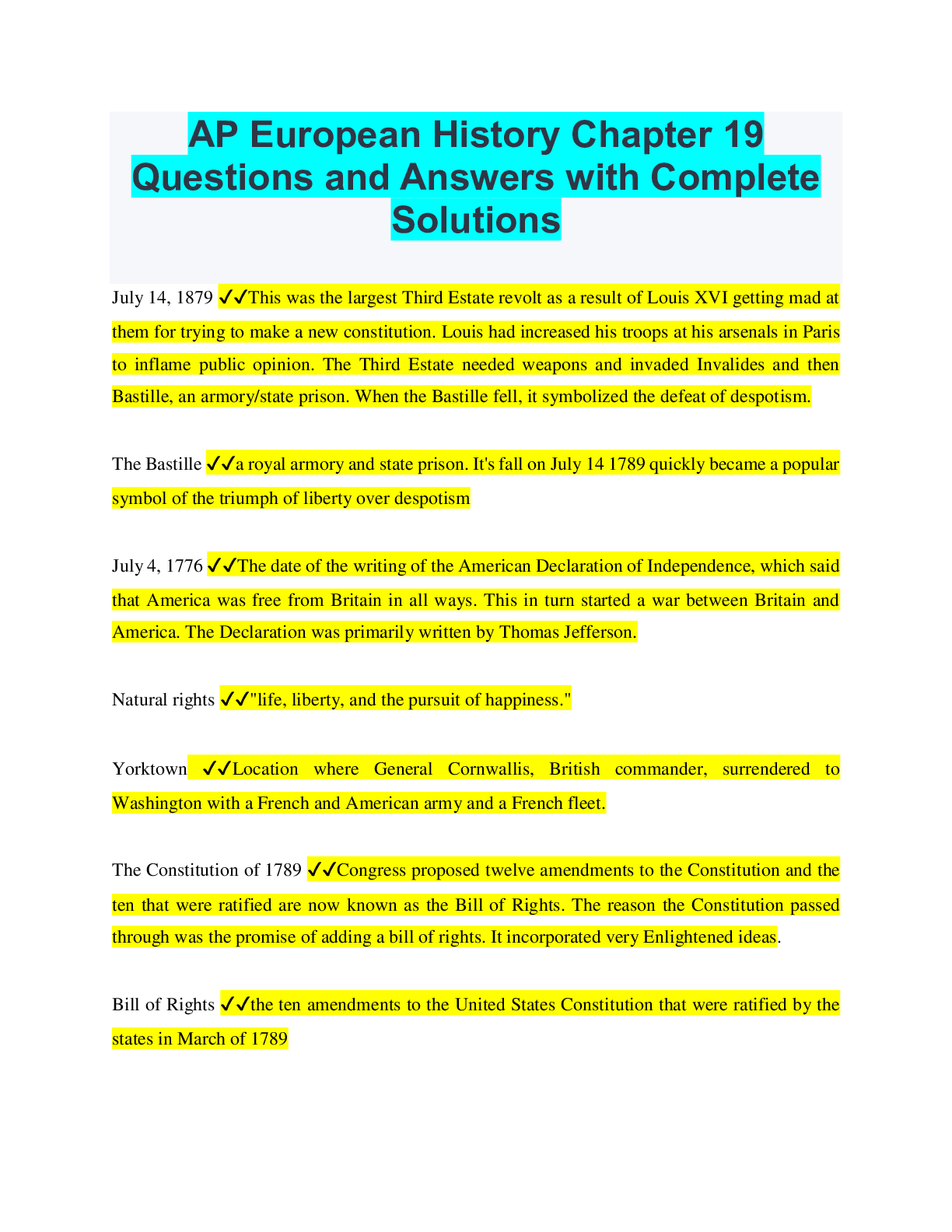
AP European History BUNDLE. ALL CHAPTERS STUDY SETS AND QUESTIONS AND ANSWERS, LATEST UPDATES. GRADED A. 2022/2023
ALL YOU NEED TO PASS THE AP EUROPEAN EXAMS. DOWNLOAD TO SCORE A'S. AP European History BUNDLE. ALL CHAPTERS STUDY SETS AND QUESTIONS AND ANSWERS, LATEST UPDATES. GRADED A. 2022/2023
By bundleHub Solution guider 3 years ago
$32
21
Reviews( 0 )
$8.00
Can't find what you want? Try our AI powered Search
Document information
Connected school, study & course
About the document
Uploaded On
Sep 27, 2022
Number of pages
35
Written in
All
Seller

Reviews Received
Additional information
This document has been written for:
Uploaded
Sep 27, 2022
Downloads
0
Views
171




